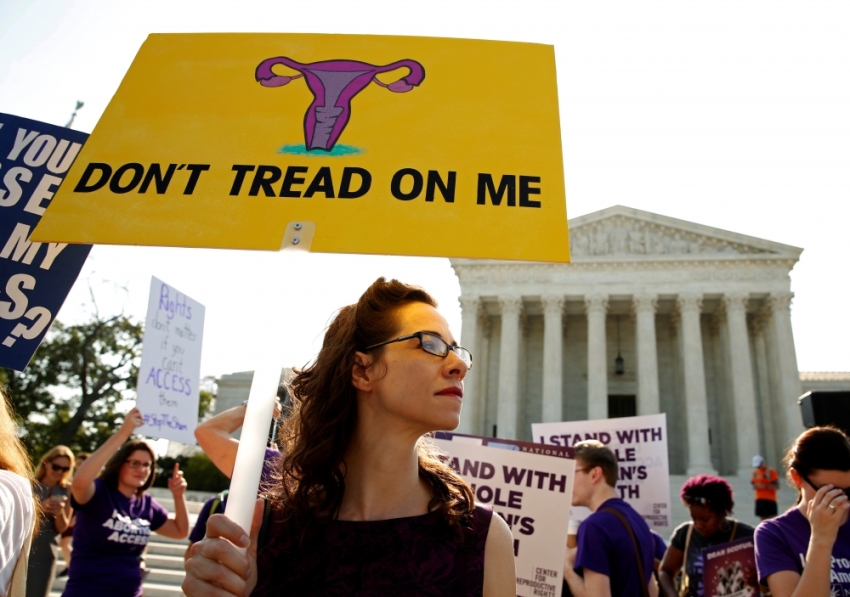Tom Cotton accuses Democrats of blackmail for threatening to pack Supreme Court over abortion case

A Republican senator has accused Democrats of trying to blackmail the United States Supreme Court by threatening to add justices to the bench if it rules that Mississippi’s 15-week abortion ban does not violate the U.S. Constitution.
Following the publication of an article in The Hill featuring Democratic senators vowing that a vote to overturn Roe v. Wade would “fuel” their push to add justices to the Supreme Court, Sen. Tom Cotton, R-Ark., tweeted a link to the article accompanied by the word: “Blackmail.”
Blackmail. https://t.co/1ZnYnnIuxf
— Tom Cotton (@TomCottonAR) May 24, 2021
Cotton’s wording suggests he believes that congressional Democrats were warning the justices that if they don't rule in favor of abortion in an upcoming case, they'll risk losing the nine-seat status quo, which even progressive justices have argued is necessary to assure the public that the body’s decisions are “guided by legal principle, not politics.”
The late Supreme Court Justice Ruth Bader Ginsburg, beloved by progressives, warned about the dangers of “one side saying when we’re in power we’re going to enlarge the number of judges so we’ll have more people who will vote the way we want them to.” The number of Supreme Court justices has remained fixed at nine for a century-and-a-half.
The Democrats’ vows to push for expanding the size of the court if the justices vote to overturn Roe followed the May 17 announcement that the court would hear an appeal from the state of Mississippi in the case of Dobbs v. Jackson Women’s Health Organization. The state of Mississippi is asking the court to reverse a lower court decision that ruled the state’s 15-week abortion ban is unconstitutional.
A ruling in favor of Mississippi would significantly weaken the central finding in the 1973 case Roe v. Wade, which ruled that women across the U.S. have the right to obtain an abortion. Currently, the court consists of six justices appointed by Republican presidents and three appointed by Democratic presidents. The makeup of the court has caused concern among Democrats, who fear that the nominally conservative majority will overturn Roe.
In April, congressional Democrats unveiled a legislative proposal to add four seats to the court, which would increase the number of justices to 13. While Democrats currently hold narrow majorities in both houses of Congress, the bill has failed to gain traction as Democratic House Speaker Nancy Pelosi indicated that she had no plans to bring it to the floor for a vote.
Speaking to The Hill, Sen. Richard Blumenthal, D-Conn., vowed that “Chipping away at Roev. Wade will precipitate a seismic movement to reform the Supreme Court.” He acknowledged that “it may not be expanding the Supreme Court, it may be making changes to its jurisdiction, or requiring a certain number of votes to strike down certain past precedents.”
Calls for adding seats to the court, a process derided by critics as “court packing,” first broke out following Ginsburg’s death last September and the Republican-controlled Senate’s push to confirm a replacement before the 2020 presidential election.
In the vice-presidential debate, then-Vice President Mike Pence asked his opponent, then-Sen. Kamala Harris, “Are you and Joe Biden, if somehow you win this election, going to pack the Supreme Court to get your way?” Harris did not answer the question directly, instead, she used her platform to criticize the Trump administration for not appointing any African-American jurists to the appellate courts.
Calls to add justices to the court grew louder following the confirmation of Justice Amy Coney Barrett as Ginsburg’s replacement. Ahead of the presidential election last October, Biden expressed openness to the idea of rotating Supreme Court justices to the lower courts and vice versa in addition to announcing his intention to put together a bipartisan commission to look at possible reforms to the court while downplaying the idea of court packing.
In the most recent challenge to an abortion law that came before the court, four of the nine justices at the time dissented from the majority opinion, finding that a Louisiana law requiring abortionists to have admitting privileges at nearby hospitals was unconstitutional. Chief Justice John Roberts, a Republican appointee, sided with the four Democrat-appointed justices by voting to strike down the law.
Since that court decision, which came down last summer, the makeup of the court has changed, with Barrett replacing Ginsburg. The pro-life movement has waited nearly a half-century for the court to roll back Roe. If Barrett votes with the four dissenters in the Louisiana abortion case to uphold the Mississippi law and all the other remaining justices vote the same way they did on the previous case, then the final decision would be 5-4 to uphold the law.
According to SCOTUSBlog, the court is scheduled to hear oral arguments for Dobbs v. Jackson Women’s Health Organization in October. Oral arguments for the upcoming term will be held on an intermittent basis, beginning on Oct. 4 and lasting through April 27, 2022. The justices will likely make a decision on the case at some point next spring, just months ahead of the 2022 midterm elections.
Ryan Foley is a reporter for The Christian Post. He can be reached at: ryan.foley@christianpost.com



























